Posts Tagged ‘Burma Partnership’ (399 found)
Open Letter to President U Thein Sein on the Arbitrary Arrest, Incommunicado Detention and Unfair Trial of Human Rights Defenders and Peaceful Protesters
Your Excellency,
Burma Partnership, a regional democracy and human rights advocacy network, and Assistance Association for Political Prisoners – Burma, a political prisoner monitoring and advocacy group, along with the human rights organizations endorsing this letter, wish to draw your attention to the arbitrary arrest, prolonged incommunicado detention, and unfair trial of human rights defenders and peaceful protesters, most recently in Salingyi Township, Sagaing Region […]
• • •Two Years On, Kachin People Push for Genuine and Just Peace
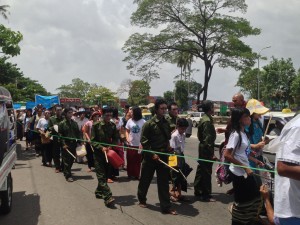 On Sunday, 9 June, sixty Kachin community organizations and Burma campaign groups in 21 countries around the world took part in a Global Day of Action today to mark the 2nd anniversary of resumed fighting between the Burma Army and the Kachin Independence Army that broke a 17-year ceasefire. Read the statement by these groups here.
On Sunday, 9 June, sixty Kachin community organizations and Burma campaign groups in 21 countries around the world took part in a Global Day of Action today to mark the 2nd anniversary of resumed fighting between the Burma Army and the Kachin Independence Army that broke a 17-year ceasefire. Read the statement by these groups here.
Simultaneously in Rangoon, eighteen organizations came together and held a briefing that included the background and political and economic reasons for the conflict throughout the country and in Kachin State, as well as the current humanitarian crisis in camps for Internally Displaced Persons (IDPs). There was an emotional appeal from two IDP women to end the fighting and a sharing of the Burman perspective from our coordinator on the Buddhist Burman superiority complex that underlines ethnic conflict throughout the country. The briefing was attended by Rangoon-based diplomats, international non-governmental organizations and civil society organizations. See photos from the briefing here […]
Burma Government Must End Impunity and Promote Religious Tolerance
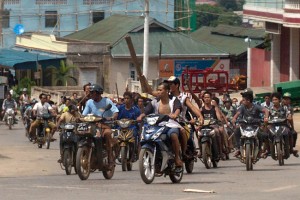 This week, mosques, schools and shops were burnt down, Muslims populations displaced, people injured and killed, and journalists attacked. These dramatic events are now common news coming out of Burma. In the last three months, religious violence took place in more than 18 townships hundreds of kilometers apart from each other, more than 44 people died, and more than 13,000 have been displaced. Yet, no appropriate actions have been taken to halt the spread of violence, extremist religious views and distrust among communities.
This week, mosques, schools and shops were burnt down, Muslims populations displaced, people injured and killed, and journalists attacked. These dramatic events are now common news coming out of Burma. In the last three months, religious violence took place in more than 18 townships hundreds of kilometers apart from each other, more than 44 people died, and more than 13,000 have been displaced. Yet, no appropriate actions have been taken to halt the spread of violence, extremist religious views and distrust among communities.
On 28 and 29 May, violence spread to Lashio, Shan State, where one Muslim was killed and four Buddhists wounded. Mobs of young men on motorcycles roamed the city with swords, destroying shops and shouting they would “kill any Muslims they see on the road.” Two Democratic Voice of Burma reporters were injured and their SIM cards stolen. The police again failed to stop the violence and protect the population. According to a New York Times source, the first police units arrived two hours after the violence started and did not confront the rioters. More than 1,400 Muslims were displaced and found shelter in a Buddhist temple. On the night of 29 May, violence spread to the town of Mone in Kyauk Gyi Township, Pegu Region, where mobs destroyed a mosque and madrasa.
• • •Two-Child Policy in Arakan State: Latest Act of Ill-treatment, Unlikely to be the Last
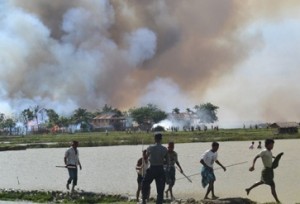 Last week, Arakan State officials, following recommendations from the internationally-rejected 186-page report of a government-appointed commission, announced a mandatory two-child policy to ‘help ease tension’ in Buthidaung and Maungdaw provinces where the majority of the population is Muslim. A year after two bouts of violence in Arakan State, this two child policy, that applies predominantly to the Rohingya population, is perhaps the most obvious outline of potential ethnic cleansing that many have voiced their concerns about, most noticeably in the last Human Rights Watch report. “The state government is trying to use the Rakhine investigation recommendation, which is outrageous, to justify a policy of limiting births of Rohingya,” said Phil Robertson, Asia deputy director of Human Rights Watch.
Last week, Arakan State officials, following recommendations from the internationally-rejected 186-page report of a government-appointed commission, announced a mandatory two-child policy to ‘help ease tension’ in Buthidaung and Maungdaw provinces where the majority of the population is Muslim. A year after two bouts of violence in Arakan State, this two child policy, that applies predominantly to the Rohingya population, is perhaps the most obvious outline of potential ethnic cleansing that many have voiced their concerns about, most noticeably in the last Human Rights Watch report. “The state government is trying to use the Rakhine investigation recommendation, which is outrageous, to justify a policy of limiting births of Rohingya,” said Phil Robertson, Asia deputy director of Human Rights Watch.
This policy announcement also marks the government’s first ‘official’ act of segregation since the outbreaks of violence that displaced as many as 125,000 Rohingya. From burning of mosques, targeted attacks on Rohingya families, denial of identity, and the implicit support of the 969 anti-Muslim campaign, now comes population control. It is unlikely to stop. This time it’s clearer than ever that the government is backing the agenda behind a campaign against the Muslims in Burma. Win Myaing, a Rakine State spokesperson said that the Rohingya population in the area is growing ten times faster than the Buddhist Arakanese and is one of the causes of the tension. Although population pressure on scarce socio-economic resources in the area should be taken into consideration, this policy serves only one purpose – defeat of the ‘unwanted’ Rohingya population […]
President Thein Sein’s US Visit Branded by Broken Promises
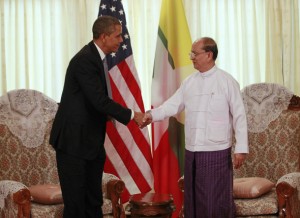 For the first time in nearly fifty years, President Thein Sein will visit the United States and meet with President Barack Obama today, 20 May. This follows the historic visit by President Obama to Burma six months ago. The visit is an opportunity for the White House to pressure Thein Sein to continue the reforms that have been taking place and highlight some of the concerns the United States, the international community and particularly the citizens of Burma have. The visit also represents the more troubling view that there has been a relaxing of the US policy of rewarding positive reforms with increased engagement and that there is more interest in the economic and geo-political benefits of the relationship than addressing and solving the very large problems that the people of Burma are facing inside their country today.
For the first time in nearly fifty years, President Thein Sein will visit the United States and meet with President Barack Obama today, 20 May. This follows the historic visit by President Obama to Burma six months ago. The visit is an opportunity for the White House to pressure Thein Sein to continue the reforms that have been taking place and highlight some of the concerns the United States, the international community and particularly the citizens of Burma have. The visit also represents the more troubling view that there has been a relaxing of the US policy of rewarding positive reforms with increased engagement and that there is more interest in the economic and geo-political benefits of the relationship than addressing and solving the very large problems that the people of Burma are facing inside their country today.
When President Obama visited Burma, Thein Sein made a series of pledges; he agreed to create a commission to review political prisoner cases with the aim of releasing all political prisoners from custody, to allow the office of the United Nations High Commissioner for Human Rights to open an office in the country, to adequately address religious violence, more specifically to hold those guilty of violence against Rohingya people accountable and address resettlement and citizenship issues, and finally to allow humanitarian organizations access to conflict areas […]
Statement on Religious and Ethnic Violence that has Occurred in Myanmar
1. We, youth representatives of all religions, strongly condemn any insult or desecration for any reason of the national flag, which is of utmost importance to our nation.
2. We, youth representatives of all religions, including Myanmar Islam youth, unreservedly oppose the manipulative use of the Quran by those from overseas for the purpose of agitation of any kind causing outbreaks of violence.
3. We, youth representatives of all religions, including Myanmar Buddhist youth, unreservedly oppose the perpetration of violence and agitation of any kind causing outbreaks of violence and goes against the teaching of Buddha […]
• • •Development Projects Fuel Conflict in Ethnic Nationality Areas
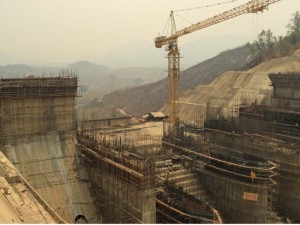 “Local communities and internally displaced persons are concerned that the dam plans will lead to increased militarization, human rights abuses, environmental destruction and loss of local livelihoods,” said the environmental lobby group, China Dialogue, talking about dam construction on the Salween River earlier this week. In recent weeks, there have been several examples of development projects directly contributing to armed conflict and militarization in ethnic nationality areas.
“Local communities and internally displaced persons are concerned that the dam plans will lead to increased militarization, human rights abuses, environmental destruction and loss of local livelihoods,” said the environmental lobby group, China Dialogue, talking about dam construction on the Salween River earlier this week. In recent weeks, there have been several examples of development projects directly contributing to armed conflict and militarization in ethnic nationality areas.
Fighting renewed between the Democratic Karen Benevolent Army (DKBA) and the government-backed Border Guard Forces in late April after the Burma Army ordered the DKBA to leave the area near the Hat Gyi hydropower dam site in Karen State. The DKBA refused to comply. Clashes have ceased but tensions remain high with the Karen National Union Brigade 5 also opposing the construction of the dam […]
Advances and Challenges to Media Freedom in Burma
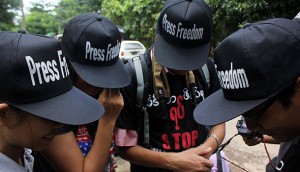 World Press Freedom Day was held on 3 May, marking an eventful year for media freedom and freedom of expression in Burma. There have been both advances towards increased freedoms, but also serious challenges.
World Press Freedom Day was held on 3 May, marking an eventful year for media freedom and freedom of expression in Burma. There have been both advances towards increased freedoms, but also serious challenges.
Most notably, the government ended pre-publication censorship and the disbanded the censorship board, the Press Scrutiny and Registration Division (PSRD). Independent organizations such as the Myanmar Journalist Association, Myanmar Journalist Network and Myanmar Journalist Union, have been permitted to form in order to promote the rights and welfare of journalists, replacing the government affiliated Myanmar Writers and Journalists Association. The Ministry of Information and Communications granted permission for 16 privately owned journals to publish dailies for the first time in 50 years starting on 1 April, with an additional 10 journals granted permission at the end of April. Many exiled journalists have returned to Burma and foreign news agencies, such as Associated Press, NHK and Kyodo News, are opening offices in Rangoon.
Despite these positive steps, there remain many challenges to the freedom of expression of journalists and publications. One of the largest threats of repression is that the Printers and Publishers Registration Act (1962) and other restrictive laws remain on the books, providing legal grounds for the government to repress critical voices […]
Burma: Human Rights Groups Condemn Ongoing Crackdown on Protests and Peaceful Assemblies
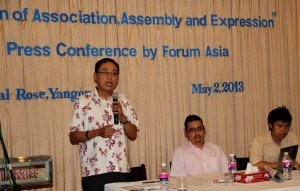 Report Highlights Violations of Freedoms of Expression, Peaceful Assembly and Association
Report Highlights Violations of Freedoms of Expression, Peaceful Assembly and Association
The Asian Forum for Human Rights and Development (FORUM-ASIA), together with its member Human Rights Education Institute of Burma (HREIB), and Burma Partnership, called on the Burma government to respect the freedoms of expression, peaceful assembly and association […]
Government Uses Political Prisoners as Bargaining Chips Yet Again
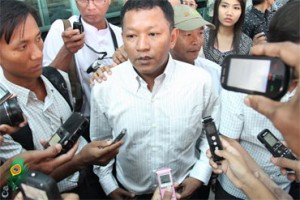 On 23 April, Burma’s government announced a presidential amnesty for 93 prisoners. Media originally reported that this included 59 political prisoners, however, the Assistance Association for Political Prisoners (AAPP) has confirmed the names of 63 released. Among those released were 40 Shan soldiers, reportedly from the Shan State National Army, and former majority shareholder of the Myanmar Times, Sonny Swe.
On 23 April, Burma’s government announced a presidential amnesty for 93 prisoners. Media originally reported that this included 59 political prisoners, however, the Assistance Association for Political Prisoners (AAPP) has confirmed the names of 63 released. Among those released were 40 Shan soldiers, reportedly from the Shan State National Army, and former majority shareholder of the Myanmar Times, Sonny Swe.
In yet another illustration of the government using political prisoners as bargaining chips, the release happened the day after the European Union decided to lift all sanctions on Burma, except an arms embargo. Previous political prisoner releases also coincided with decisions made by the international community or visits by key international figures, such as US President Barack Obama’s visit last November.
Ko Bo Kyi from AAPP welcomed the amnesty, although he said the government failed to carry out the decision properly: “The release of the political prisoners should be publicly announced. The government should treat them with dignity,” he said. “They are somewhat like bargaining chips, used by the government to gain some achievements” from the international community. AAPP estimates that there are still more than 200 political prisoners […]
• • •








 All posts
All posts